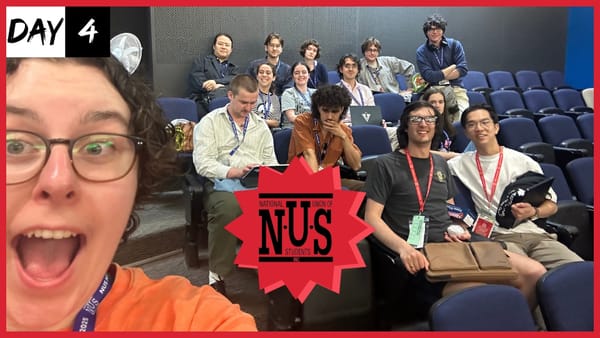(EdCon)omy of Care – Day 3

Another two plenaries eclipsed Day 3 of the Education Conference. The first was on Diversity in Education by the Women’s Officer Ellie Venning – whose motivation was to highlight the segregation of university courses through a panel which included Jade Poulton (ANU Women’s Officer), Libby Austin (NX General Executive, WSU), Tritian Young-Glasson (ANU Women in STEM), and Tess Robb (Swinburne SA Vice-President).
The second plenary was on The Housing Crisis in Australia by Jordan Van Den Lamb – a lawyer, unionist, housing activist, and 2025 Senate candidate. He founded “Shit Rentals”, a platform exposing poor housing conditions, and is a leading voice in the fight for renters’ rights and housing justice in Australia.
Although both plenaries were incredibly insightful, I found that some of the workshops were more in need of attention. The workshop entitled ‘Why the NDIS fails disabled people’ is one that I was already familiar with from the previous year – a constant issue for those who need care and services. Here’s what happened.
What is the NDIS?
The NDIS stands for the National Disability Insurance Scheme and is part of the Australian Department of Health. The scheme is governed by the National Disability Insurance Scheme Act 2013 (NDIS Act) and is administered by the National Disability Insurance Agency (NDIA).
Founded in 2013 after disability groups campaigned to “Make it Real”, the scheme aimed to support and fund people with disabilities who meet four key requirements: be under the age of 65, live in an NDIS area, have a permanent and significant disability, and require support or early intervention.
This Story’s Been Told Before
The workshop began by reiterating facts from the last year’s Education Conference discussions, with the recent cuts and attacks being traced back to the $124 billion cuts in the 2024 Federal Budget.
Recently, following mounting concerns about the NDIS’s rising costs, the Albanese government launched the “Getting the NDIS Back on Track” campaign, aimed at making the scheme more sustainable. In response, Bill Shorten introduced reforms to reduce the scheme’s annual growth from nearly 20% to 8% by 2026, resulting in $14.4 billion in projected savings over four years.
So, What’s New?
“The government is making it harder,” one speaker said. In October 2024, NDIS reforms forced all participants to have their supports reapproved and many lost access to vital care overnight. One report described people are being hospitalised with malnutrition and dehydration after losing funding for feeding tube support, showing just how dangerously the system has failed its most vulnerable.
The new NDIS rules mean participants can only spend funds on a strict list of approved supports, and anything outside that won’t be covered. Participants can no longer get automatic top-ups and every extra dollar spent needs to be proved with evidence. ‘Inappropriate spending’ is now monitored and if the NDIS suspects it, they can ask for the money back. Plans are now tied directly to specific impairments, and the NDIA can step in to change how the funds are managed if they think there’s a risk of harm or misuse.
The students argued that the NDIS isn’t a universal service – it’s an insurance scheme, and that distinction matters. Because it’s built on a market-based, neoliberal model, providers are forced to compete for participants’ business, creating an incentive to cut corners and prioritise quantity over quality. They claimed the real cause of waste in the scheme isn’t participants, but the fact that a chunk of funding inevitably ends up lining the pockets of corporate providers.
The speaker highlighted that there are now entire podcast networks: “at least 5 channels” dedicated to helping providers profit from the NDIS. They invoked a pointed quote to compare corporations, asking: “Why are we giving our money to these psychopaths?”
They argued that choice under capitalism is an illusion, using biting examples: “You get to choose which supermarket to buy an $8 carton of eggs from. You get to choose which Catholic hospital to attempt an abortion at. You get to choose which mouldy apartment to spend a crazy amount of money to rent.” The NDIS, they said, offers the same kind of hollow freedom – limited, costly and exploited.
Despite the scheme’s ballooning costs, the quality of services rarely matches what people are paying for. The $125 billion figure often cited as NDIS spending doesn’t even come close to what the government set aside for nuclear submarines.
Crucially, the speaker argued the real issue isn’t overspending on disabled people, it’s that millions of dollars are flowing away from them entirely. The current system narrows the horizon for people with disabilities, making it seem like there’s no alternative. But there is: a future where care is provided based on need, not profit, and where the severity of a person’s disability doesn’t determine whether they receive support or not.
Discussion
While all factions acknowledged the NDIS is in crisis, debate quickly splintered over who’s to blame and what should replace it. Unity opened by challenging SAlt’s argument: “Are you saying just because some companies profit, the entire NDIS is a failure?” They also accused SAlt of ignoring wider disability campaigns, noting that “not all disabled people receive NDIS.”
SAlt stood firm, calling for the abolition of the NDIA and the full nationalisation of disability services. One speaker shared the story of a terminally ill mother whose NDIS care hours for her son with cerebral palsy were cut – framing it as a symptom of a profit-driven system. “It’s the government’s job to provide care, not put red tape around it,” they said.
Unity pushed back, arguing that tearing down the scheme would leave people with nothing. NLS proposed a gradual dismantling with protections in place, but SAlt replied, “That’s already happening … millions aren’t covered now.” Tensions rose when NLS demanded a clear answer: would SAlt commit to not leaving people behind? They didn’t get one.
The discussion veered between ideological divides and practical concerns. An ANU event organiser claimed the NDIS is “demand-based” – that people who need it will get it – prompting an eruption from SAlt, who called the line “pure Peter Dutton.” The conversation closed with SAlt reaffirming their position: “It’s not utopian to nationalise services – what’s shocking is that Labour students can’t get behind that.”




